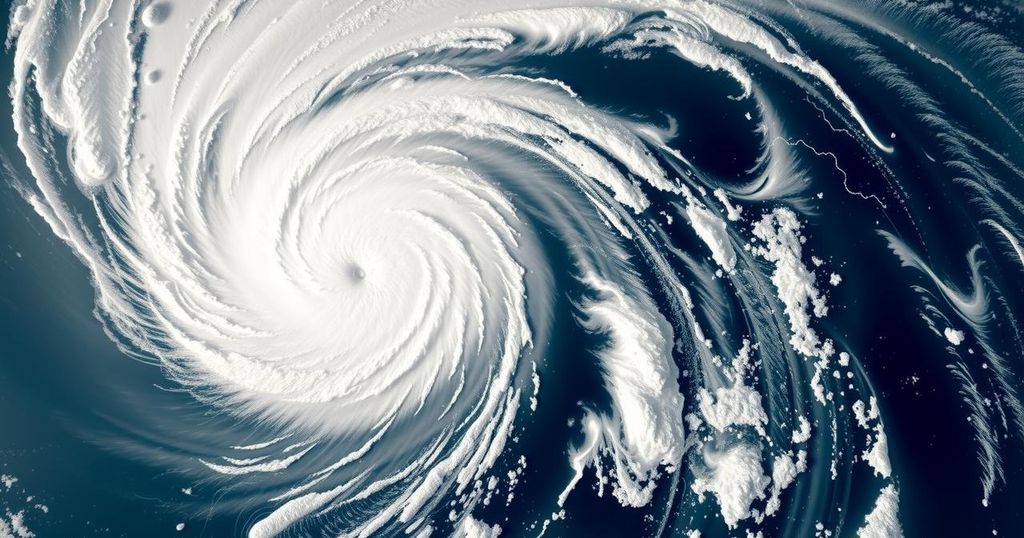Cyclone Chido has caused severe destruction in Mayotte with winds over 220 km/h, prompting emergency measures. While there are no initial reports of casualties, extensive property damage has been observed. The storm is projected to continue toward Mozambique, where millions are at risk. Historical context reveals the cyclic nature of these storms and their increasing strength due to climate change.
Tropical Cyclone Chido has wreaked havoc in Mayotte, a French territory in the Indian Ocean, as it makes its way toward the eastern coast of Africa. According to the French weather service, the cyclone’s winds exceeded 220 kilometers per hour, resulting in significant damage such as torn-off metal roofs from residences. Fortunately, there have been no immediate reports of casualties thus far. The Prefect of Mayotte, Francois-Xavier Bieuville, indicated that this cyclone is the most severe to strike since 1934, and many residents have lost everything. As the situation stabilizes, emergency services have been mobilized to assist the affected population.
In response to the cyclone, Mayotte remains under a red alert for the general public, with officials urging residents to seek stable shelter. Emergency services are authorized to operate in the aftermath of the cyclone, while thousands of homes are reported to be without power. Other structures, including tin huts, have been destroyed, and numerous trees have been uprooted. Moreover, French Interior Minister Bruno Retailleau noted that extensive damage was evident and expressed commitment to emergency response.
Additionally, Cyclone Chido is impacting Comoros Islands, located north of Mayotte, where the highest red alert has been issued. Authorities there are particularly concerned for a group of fishermen who have gone missing since Monday. To ensure safety, all ships have been instructed to remain docked, and schools and government offices have been closed to allow citizens to prepare for the cyclone’s impact. Forecasters predict that Chido will continue its path eastward and may reach Mozambique by late Saturday or early Sunday, threatening approximately 2.5 million people in northern regions.
As Cyclone Chido approaches, neighboring countries like Malawi and Zimbabwe are also taking precautions, anticipating flooding and possible evacuations. The cyclone season, spanning from December to March, has historically brought significant challenges to this region. Cyclones Idai and Freddy in previous years exemplified this, causing over 2,300 fatalities across Mozambique, Malawi, and Zimbabwe. The aftermath of such storms not only poses immediate dangers from flooding and landslides but also increases the risk of waterborne diseases such as cholera, dengue fever, and malaria, particularly exacerbated by stagnant water.
The intensity of these cyclones has been linked to climate change, as studies denote a trend towards worsening conditions. Consequently, nations in southern Africa, which contribute minimally to global climate change, often face disproportionately severe humanitarian crises following these events.
The article discusses the devastating impact of Tropical Cyclone Chido, which has struck the French territory of Mayotte and is headed toward eastern Africa. The cyclone is described as the most destructive seen in the region since 1934, causing extensive damage and prompting emergency responses. The article also highlights the historical context of cyclone seasons in the southeastern Indian Ocean, detailing previous cyclones that have resulted in significant fatalities and humanitarian crises due to climate change exacerbating cyclone severity.
In conclusion, Tropical Cyclone Chido has caused extensive damage in Mayotte and is expected to continue its path toward eastern Africa. Emergency services have been mobilized in response, as communities prepare for the potential devastation in Mozambique and surrounding regions. The crisis reflects a broader issue of increasing cyclone severity linked to climate change, posing ongoing threats to vulnerable populations in southern Africa.
Original Source: www.voanews.com







